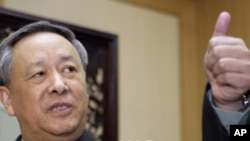A top military official from China is scheduled to visit the United States this week on the first such high-level visit in seven years. The delegation is expected to include several high-ranking Chinese military leaders who will hold talks with U.S. military leaders that officials and analysts say will focus on building trust between the two countries.
Although 2010 was a difficult year for military relations with China, Sino-American defense ties appear to be on the mend.
U.S. Defense Secretary Robert Gates visited China in January, the two countries held talks in Beijing early last month as well as last week during the U.S.-China Strategic and Economic Dialogue meetings here in Washington. This week, Chen Bingde, the chief of the general staff of the People's Liberation Army, is here for a week-long visit.
China's Defense Ministry spokesman Geng Yansheng says Chen's visit will focus on advancing bilateral military relations and that officials will discuss regional as well as global issues. "The Chinese side believes that to push military relations forward, the key is for China and the United States to respect and accommodate each other's core interests and major concerns, and to appropriately handle disputes and sensitive issues. China stands ready to work together with the United States, enhancing dialogue and exchange, increasing mutual understanding and building up mutual trust," he said.
During his visit to the United States, Chen will meet with his U.S. counterpart, Joint Chiefs of Staff Chairman Admiral Michael Mullen, as well as Secretary of State Hillary Clinton and U.S. lawmakers.
Abe Denmark, an Asia security analyst and former country director for China affairs at the Pentagon, says the visit is significant. "It's an important sign that both sides see our military to military relationship is important," he said.
Denmark says that China has several goals for this trip, to show that its military relationship with the United States is strong, to advance its message that it has peaceful intentions, while engaging the United States on a broad range of issues, and to learn. "[China wants] to talk to American military leaders and other leaders throughout the U.S. government and to learn how the United States thinks about China and how the United States thinks about an increasingly multipolar world," he said.
As for the United States, Denmark says it will likely use the talks to show how it is open and transparent, and that bilateral communication is essential. "As China rises and becomes more powerful, communication between China and the United States is going to become increasingly central to sustaining regional and international stability," he said.
Maintaining sustained Sino-American military ties has been challenging. At various times, Beijing has suspended military relations when disputes have arisen with the United States. Most recently, it froze military ties with the United States for much of last year, after President Barack Obama approved a $6.4 billion arms deal to Taiwan.
Arms sales to Taiwan have long been a major sticking point in Sino-American relations and analysts say China will likely raise the issue during this week's talks.
China wants the United States to end all arms sales to Taiwan, which it considers a part of its own territory. But under U.S. law, Washington is obligated to provide weapons systems to the island to help it meet its defensive needs.
Analysts like Abe Denmark say that such disagreements are why the two sides need to meet regularly and build understanding. "I think that understanding is improving. That being said, I do think that several significant disagreements remain and there are areas within those disagreements where we need to better understand one another in order to reduce chances of misunderstanding and miscalculation," he said.
China's state-run Xinhua news agency says that during Chen's visit this week, he will deliver an address at the National Defense University in Washington and that his delegation will visit several U.S. military installations. According to the report, a Chinese defense official praised such visits, noting that some of the sites on this week's agenda have not accepted visiting military leaders in years.




